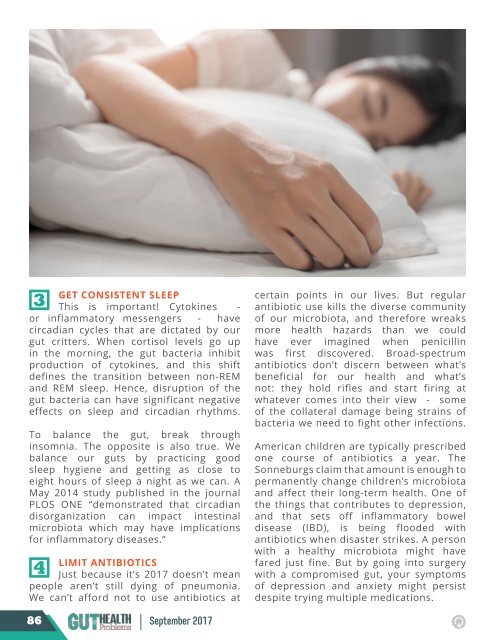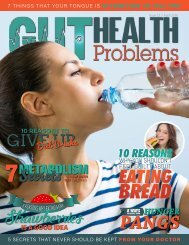Gut Health Problems - September 2017
In the eighth issue of Gut Health Problems, we have an overview of the vast benefits of probiotics, a checklist of foods rich in zinc, an intro to determining if you have fiber deficiency, and more. Intestinal discomfort, whether chronic or occasional, is something worth taking the time to prevent. And while we all have those foods that give us problems, you may actually be able to make a change that makes a bigger difference than you ever imagined.
In the eighth issue of Gut Health Problems, we have an overview of the vast benefits of probiotics, a checklist of foods rich in zinc, an intro to determining if you have fiber deficiency, and more. Intestinal discomfort, whether chronic or occasional, is something worth taking the time to prevent. And while we all have those foods that give us problems, you may actually be able to make a change that makes a bigger difference than you ever imagined.
You also want an ePaper? Increase the reach of your titles
YUMPU automatically turns print PDFs into web optimized ePapers that Google loves.
3<br />
GET CONSISTENT SLEEP<br />
This is important! Cytokines -<br />
or inflammatory messengers - have<br />
circadian cycles that are dictated by our<br />
gut critters. When cortisol levels go up<br />
in the morning, the gut bacteria inhibit<br />
production of cytokines, and this shift<br />
defines the transition between non-REM<br />
and REM sleep. Hence, disruption of the<br />
gut bacteria can have significant negative<br />
effects on sleep and circadian rhythms.<br />
To balance the gut, break through<br />
insomnia. The opposite is also true. We<br />
balance our guts by practicing good<br />
sleep hygiene and getting as close to<br />
eight hours of sleep a night as we can. A<br />
May 2014 study published in the journal<br />
PLOS ONE “demonstrated that circadian<br />
disorganization can impact intestinal<br />
microbiota which may have implications<br />
for inflammatory diseases.”<br />
4<br />
LIMIT ANTIBIOTICS<br />
Just because it’s <strong>2017</strong> doesn’t mean<br />
people aren’t still dying of pneumonia.<br />
We can’t afford not to use antibiotics at<br />
certain points in our lives. But regular<br />
antibiotic use kills the diverse community<br />
of our microbiota, and therefore wreaks<br />
more health hazards than we could<br />
have ever imagined when penicillin<br />
was first discovered. Broad-spectrum<br />
antibiotics don’t discern between what’s<br />
beneficial for our health and what’s<br />
not: they hold rifles and start firing at<br />
whatever comes into their view - some<br />
of the collateral damage being strains of<br />
bacteria we need to fight other infections.<br />
American children are typically prescribed<br />
one course of antibiotics a year. The<br />
Sonneburgs claim that amount is enough to<br />
permanently change children’s microbiota<br />
and affect their long-term health. One of<br />
the things that contributes to depression,<br />
and that sets off inflammatory bowel<br />
disease (IBD), is being flooded with<br />
antibiotics when disaster strikes. A person<br />
with a healthy microbiota might have<br />
fared just fine. But by going into surgery<br />
with a compromised gut, your symptoms<br />
of depression and anxiety might persist<br />
despite trying multiple medications.<br />
86<br />
<strong>September</strong> <strong>2017</strong>

















